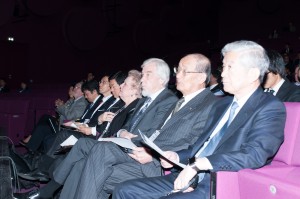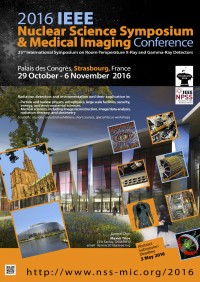
Opening IEEE: Junichi Nishiyama (AAA), Takashi Nishioka (AAA), Rolf-Dieter Heuer, Catherine Trautmann, Hon. Shintarou Ito, Hon. Takeshi Shina, Satoru Yamashita (from right to left)
The 2016 IEEE Nuclear Science Symposium and Medical Imaging Conference (NSS/MIC) is being held in Strasbourg, France from 29 October to 6 November. The opening plenary addressed a central pillar necessary to make fundamental research progress at a pace reflecting mankind’s ability to take up challenges and push the frontiers of knowledge – very large infrastructures, requiring world-wide expertise and effort provided through enhanced international cooperation, are essential to today’s (and tomorrow’s) research landscape.
Chaired by Rolf Heuer, former CERN Director-General, the opening session contained two keynote presentations: Immaculada Figueroa, Executive member of the European Strategy Forum on Research Infrastructures (ESFRI), presented plans for the update of its roadmap for the year 2018 and Atsuto Suzuki, former KEK Director General, spoke about international research cooperation from a Japanese perspective. Suzuki gave an excellent overview of Japan’s participation in large-scale research infrastructure projects, such as the International Space Station ISS, the ITER fusion project, neutrino programmes plus a special emphasis on the International Linear Collider (ILC). The session was followed by greetings from two Japanese Diet Members, the Honorable Shintaro Ito and the Honorable Takeshi Shina. I was very impressed with their enthusiastic statements about and encouragement of the ILC project. Another highlight was a talk by Barry Barish of Caltech, former Director of the Global Design Effort for the ILC, called “Einstein’s Gravitational Waves Observed.”
 A dedicated forum about very large transregional research infrastructures took place later that afternoon with people knowledgeable about the EU, Strasbourg City and Eurometropole officials, directors of major particle physics laboratories, representatives of funding agencies and special guests. Among the highlights were contributions from the Hon. Shintaro Ito, Japanese Diet member, Takashi Nishioka, Chair of the Japanese Advanced Accelerator Association promoting science and technology (AAA) and Catherine Trautmann, former French Minister and member of the EU Parliament. The discussion concentrated on the importance of concrete next steps towards the realisation of the ILC between European countries and Japan in the coming two years, and the opportunity for the ILC to re-appear on the ESFRI roadmap.
A dedicated forum about very large transregional research infrastructures took place later that afternoon with people knowledgeable about the EU, Strasbourg City and Eurometropole officials, directors of major particle physics laboratories, representatives of funding agencies and special guests. Among the highlights were contributions from the Hon. Shintaro Ito, Japanese Diet member, Takashi Nishioka, Chair of the Japanese Advanced Accelerator Association promoting science and technology (AAA) and Catherine Trautmann, former French Minister and member of the EU Parliament. The discussion concentrated on the importance of concrete next steps towards the realisation of the ILC between European countries and Japan in the coming two years, and the opportunity for the ILC to re-appear on the ESFRI roadmap.
My personal summary is that there were very positive and forward-looking discussions, and I have been much encouraged for the prospects of realising the ILC.I deeply thank Maxim Titov, 2016 IEEE NSS/MIC General Chair and Marc Winter, Conference Liaison to the EU, who co-organised this event.


Recent Comments